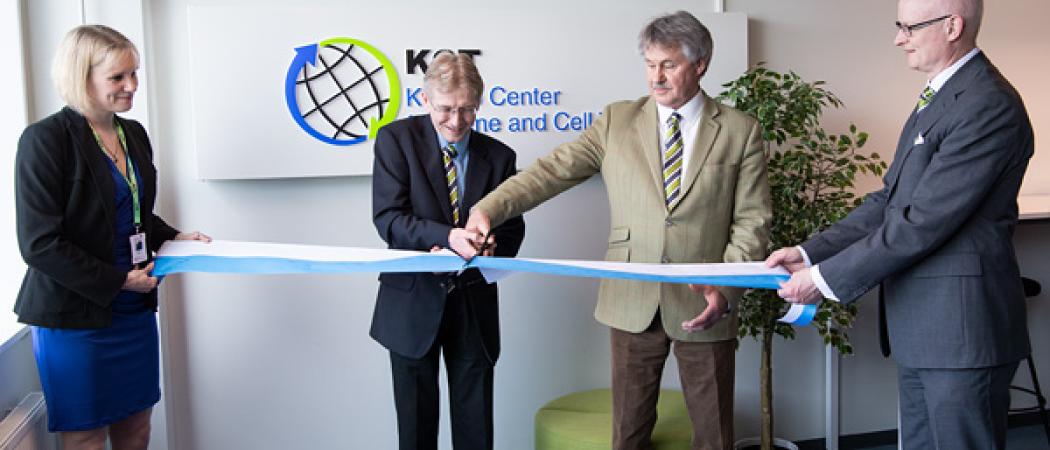
Gene Therapy Unit Director Hanna Lesch (on the left), Academy Professor Seppo Ylä-Herttuala, Dr Nigel Parker and CEO Timo Ristola in the opening ceremony of KCT.
Kuopio Center for Gene and Cell Therapy, KCT, is a new and significant opening established in Kuopio to facilitate long-term, top-level research at the interface of the academic and corporate sectors. Kuopio Center for Gene and Cell Therapy provides research groups with funding, facilities and opportunities for collaboration with the University of Eastern Finland, the viral-based gene therapy product company FinVector, and Kuopio University Hospital. The research centre is funded by the Swiss Dr Frederik Paulsen Foundation.
The driving forces behind KCT are gene therapy pioneers Academy Professor Seppo Ylä-Herttuala from the A.I. Virtanen Institute for Molecular Sciences of the University of Eastern Finland, and FinVector's board member, Dr Nigel Parker. The activities of FinVector rest on Ylä-Herttuala's long-term research, and the Dr Frederik Paulsen Foundation is also the current owner of the company.
According to Ylä-Herttuala, there is a need at the interface of academia and closely regulated pharmaceutical companies for a professional research centre that can guarantee funding for promising research projects.
“We have now reached this objective, and KCT has secured an annual budget of 8-10 million euros for the upcoming five years.”
The idea of KCT is to attract high-level research groups from all over the world to work on projects that can lead to the discovery and introduction into the markets of novel cell or gene therapy drugs. The first projects are already being negotiated. In addition to KCT’s own cell, gene and analytics units, researchers will also have access to the research expertise and infrastructures of the University of Eastern Finland and Kuopio University Hospital, as well as to the expertise of the National Lab Animal Centre, and the production expertise of FinVector.
“The university can expect new research from KCT, and patients at Kuopio University Hospital will benefit from next-generation treatments arising from the centre,” Ylä-Herttuala envisioned in the opening ceremony.
According to Parker, the funding and the attractiveness of KCT are based on the unique cluster of expertise present at the Kuopio Campus. “There are only few places in the world where it is possible to go from the manufacturing of virus vectors all the way to functional studies, animal testing and clinical trials. In Kuopio, this is not only possible, but possible within a square kilometre of space.”
The model of KCT is one of its kind in Finland. According to CEO Timo Ristola, later it will be possible to finance the activities of KCT with profits from drugs that have been developed at the centre and then introduced into the markets.
KCT is located in the Bioteknia building and it employs 25 people. The centre is currently looking to hire a research director with a solid and international scientific track record. Dr Stanley Prusiner, a Nobel Prize winner, serves in an advisory capacity in KCT.
This release was first published 15 May 2018 by the University of Eastern Finland.




 A unique international forum for public research organisations and companies to connect their external engagement with strategic interests around their R&D system.
A unique international forum for public research organisations and companies to connect their external engagement with strategic interests around their R&D system.